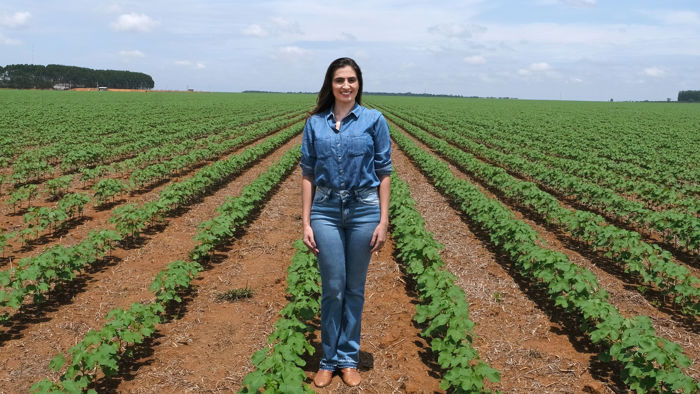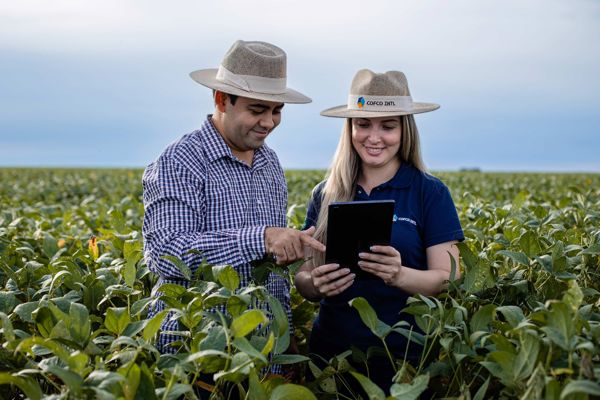
The importance of tracing the supply chain
Being able to fully trace the source and supply of key agricultural commodities is not a simple process but has become essential to ensure appropriate social and environmental safeguards.
Tracing the supply chain
Traceability is the ability to trace all processes from procurement of raw materials to production and consumption, so it is clear where the product was produced and by whom. It is particularly important for a product like soy which is sourced from environmentally and socially sensitive areas such as Brazil’s Cerrado, the world’s most biodiverse savannah, because it ensures clear monitoring of whether land used for production has been deforested or is located inside protected areas that should not be used for production of grains.
COFCO International’s commitment to support the sustainable and responsible production and sourcing of soy, aiming for full traceability for direct purchases of soy from Brazil by 2023, is an important part of these efforts. Such traceability is the first step to really understanding the supply chain and its potential risk exposures, which in Brazil are focused on deforestation, conservation of native vegetation and related environmental and social issues.
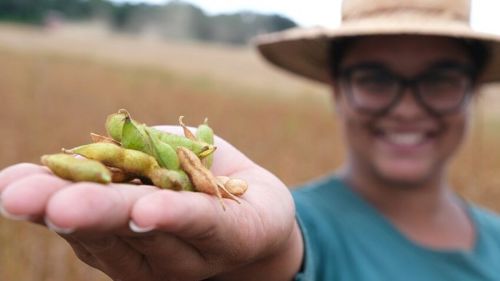
“When we know exactly where the product was grown, it becomes possible to conduct precise analyses and mitigate the impact,” says Julia Moretti, Global Head of Sustainability. “Once the geographic information of the farm is obtained, we upload it in COFCO’s system, enabling our teams to see any environmental and social risks associated with that precise location, such as deforestation or indigenous areas.”
COFCO International works with more than 7,000 farmers in Brazil and all of them are expected to comply with its Supplier Code of Conduct and commodity-specific sourcing policies, including to respect the rights of people, local communities and indigenous peoples, to collaborate in increasing soy supply chain traceability, eliminating deforestation throughout the company’s supply chain and transitioning towards soy production free from native vegetation conversion.
Proof, with external validation
COFCO International’s efforts on traceability have resulted in a significant success in Brazil. In 2020, the company teamed up with the International Finance Corporation (IFC), a member of the Good Growth Partnership from the United Nations Development Programme (UNDP), which coordinates a wide range of stakeholders and initiatives to reduce deforestation and enable sustainable development in three global commodity supply chains: soy, beef and palm oil. It includes an integrated approach to reduce environmental threats in Matopiba and to promote sustainable soy production.
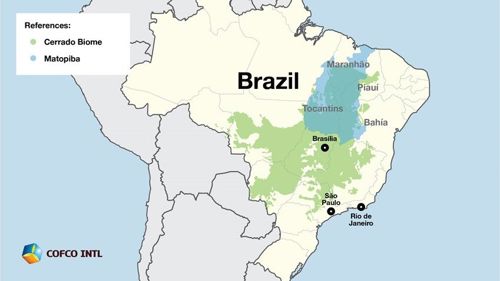
Matopiba spans more than 73 million hectares with 90 percent of its surface located in the Cerrado. With Brazil’s rise to become one of the world’s top producers and exporters of soybean, Cerrado’s ecosystems have come under increasing pressure from land conversion and agricultural expansion, with Matopiba at the forefront.
To support this, COFCO International’s partnership with IFC included Agrosatélite, a company that uses remote sensing satellite images to observe the Earth’s surface and possible impact of soy cultivation on the country’s most valuable ecosystems. In December 2021, COFCO International reached full traceability and completed social and environmental screening of all its directly sourced soy in the Matopiba region.
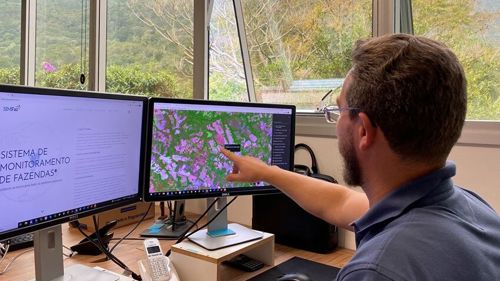
COFCO International’s partnership with IFC included Agrosatélite, a company that uses remote sensing satellite images to observe the Earth’s surface and possible impact of soy cultivation on the country’s most valuable ecosystems. Photo: Agrosatelite.
This achievement is based on COFO International’s early efforts in traceability, which was a condition for pre-financing soy farmers in Brazil. All pre-finance operations include environmental and social risk assessments for each farm, to ensure that all volumes sourced are traceable. This step was included in COFCO International’s credit policies and processes, at the request of IFC, which was one of the company’s shareholders at that time.
Full alignment
COFCO International’s traceability work is a collective effort throughout the company. The geographical location of each farm needs to be documented throughout the process, from the commercial team when negotiations start, through the administrative and sustainability departments inputting geographical data in the COFCO International systems and all teams ensuring that information is correctly kept in the contract, invoices, logistics records and other documentation through operation.
“We need the precise geographical data of any farm we want to work with. We can then compare the location with maps and layers showing various social and environmental risks and immediately see if there is any overlap,” Moretti says.
The social and environmental risk criteria are defined in COFCO International’s Sustainable Soy Sourcing Policy, which also establishes how the farm-level analyses are to be implemented, based on a risk approach.
All farms in high or medium risk municipalities, and which have not gone through the pre-financing process, are subject to satellite image assessment. The actions taken depend on the findings: these could be to offer new market opportunities to the producer, such as certification schemes, or in the worst-case scenario, to immediately stop any business. This process can only be achieved through having full traceability.
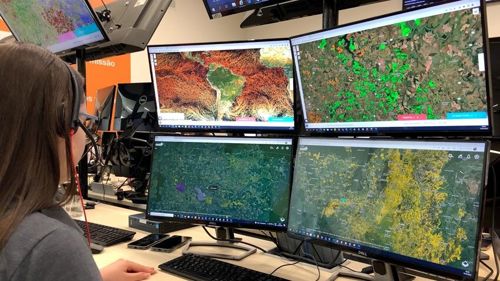
COFCO International’s traceability work is a collective effort throughout the company. The geographical location of each farm needs to be documented throughout the process, from the commercial team when negotiations start.
From nice to have to must have
Accelerating climate change, highlighted by major international events such as The Paris Agreement and last year’s COP26 UN Climate Change Conference, has significantly increased awareness of sustainability among financial institutions and their customers, explains Vivek Sharma, Group Head of Financing for COFCO International.
COFCO International’s leadership in traceability in the soy supply chain played a major role in its securing of two sustainability-linked loans, totalling $3 billion. Under the terms of these loans, the lenders agreed to provide financial incentives in the form of lower interest rates for COFCO International to achieve pre-agreed sustainability targets covering the traceability and socio-environmental screening of its Brazil soy supplies and overall environmental, social and corporate governance rating from the independent agency Sustainalytics.
The first of these loans, worth $2.3 billion, was the largest sustainability-linked loan for a commodity trader. The second loan of $700 million extended the targets to include screening as well as tracing.
Sustainability-linked loans require a high degree of proof and assurance of the social and environmental targets, and details of companies’ sustainability practices, sourcing policies, suppliers, due diligence carried out and commitments for the next three to five years. Lenders require all of these to be audited and verified by a third party.
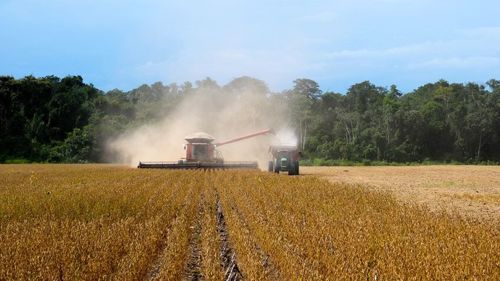
COFCO International’s leadership in traceability in the soy supply chain played a major role in its securing of two sustainability-linked loans, totalling $3 billion.
“Banks are increasingly looking to support companies with loans linked to sustainability performance, in line with their own social and environmental goals. Being able to prove the sustainability of your business enables access to more financing and at better rates. The targets must be serious, ambitious, and entirely provable so that lenders are certain that companies are fulfilling their promises. Basically, sustainability used to be a nice to have, but gradually it is becoming a must have for most industries and especially large corporates,” Sharma says.
“When we talk about sustainability linkage, it’s about pricing as well as availability of financing as more banks become interested in lending larger amounts.”
This embedding of traceability in COFCO International’s financing strategy is a major advantage for its sustainability work, Moretti says. “This brings significant benefits, because it both raises the profile of our work and we also invest the margin savings from these loans to fund further sustainability initiatives,” she adds.
